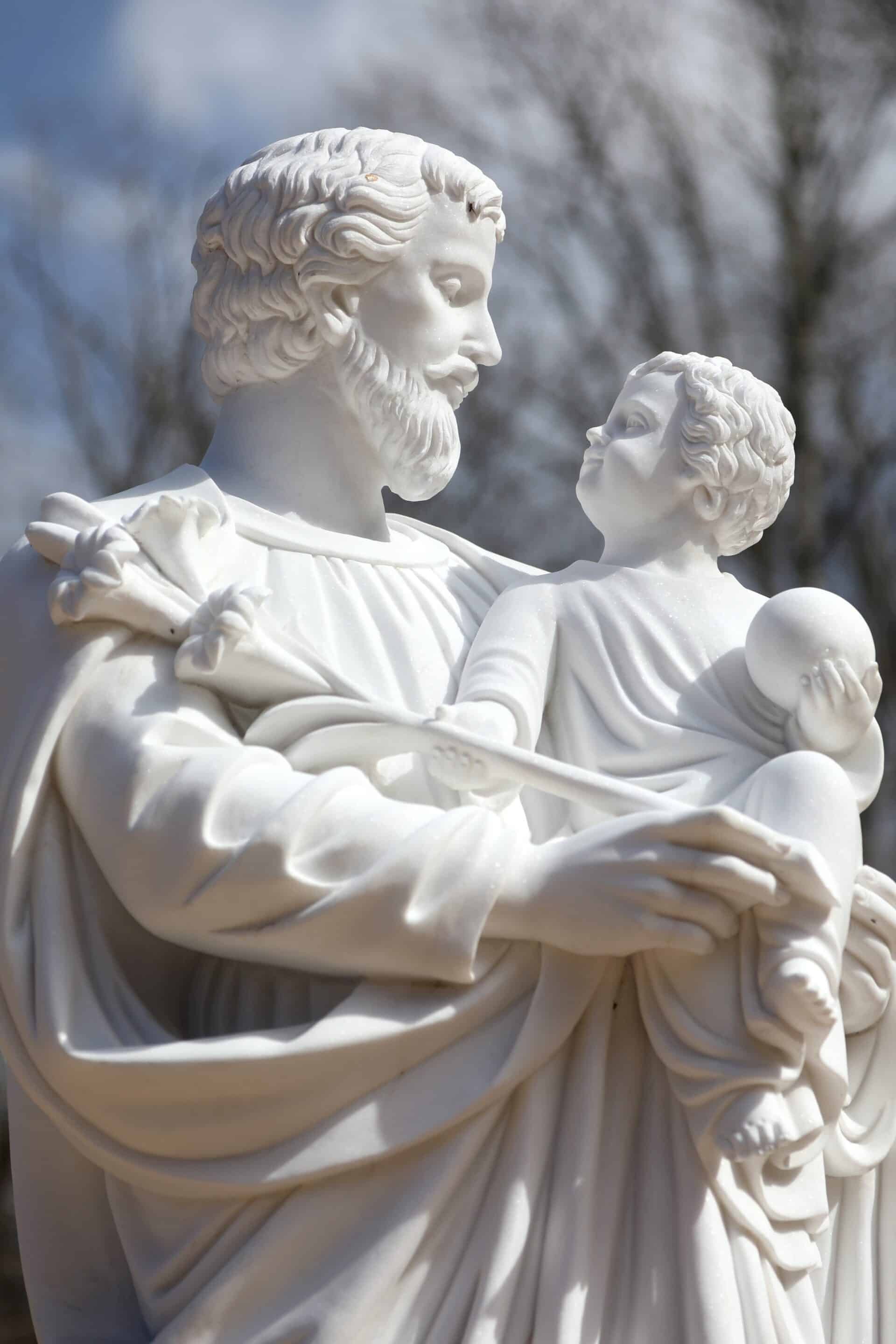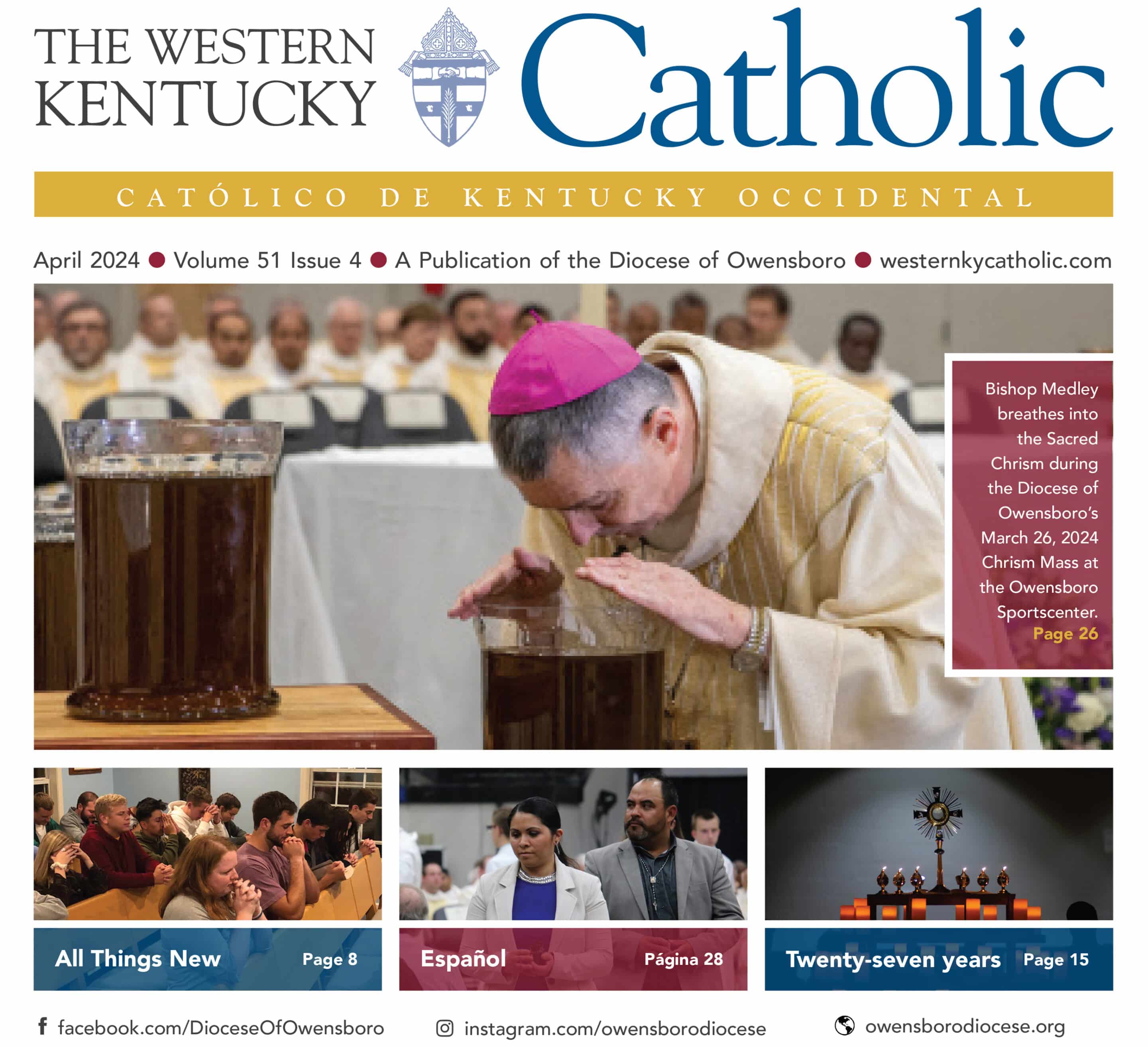
A statue of St. Joseph and the Christ Child is pictured at Jesus the Divine Word Church in Huntington, Md., April 1, 2022. (CNS photo/Bob Roller)
A Word From Bishop Medley: A silent witness
My Dear Sisters and Brothers in Christ,
When it comes to the Church’s liturgy and practice, most of us associate the month of March with Lent. Ash Wednesday has usually fallen in February, so by March we are well-practiced in our pledges of prayer, fasting and almsgiving. And, after all, apart from our religious life, March usually begins to show us some sustaining glimpses of winter’s end and spring’s beginning. The word “Lent” actually means “spring.”
But no liturgical season is absolute. Just as the beginning of spring does not guarantee that cold weather or even snow and ice are behind us, so Lent does not preclude other celebration within its 40 days. There are three prominent non-Lenten feasts in the month of March: the 17th is the feast of St. Patrick, the 19th is the feast of St. Joseph, and the 25th is the feast of the Annunciation of the Lord. If the latter two of these should fall in Holy Week, the feasts are transferred to after Easter. (In United States culture today, the feast of St. Patrick has become more of a civil celebration than a religious one, though the story of St. Patrick remains compelling.)
For this month’s column I wish to share some reflections on St. Joseph. Anything we truly know about St. Joseph comes from the Gospels of Matthew and Luke, and even there the references are few. Legend and tradition have passed along other stories, but often centuries after Joseph actually lived.
Matthew relates Mary’s virginal conception of Jesus and notes that St. Joseph “being a man of honor and wanting to spare her publicity, decided to divorce her informally.” Then Joseph experienced the first of several dreams in which God directed him in his role of father and in salvation history. Later dreams led Joseph to take Mary and Jesus to Egypt and later to Nazareth.
Luke explains that Jesus was born in Bethlehem, which was Joseph’s ancestral home, and that they had traveled there because Caesar Augustus had ordered a census that took citizens to their homeland.
The final mention of Joseph in the Bible relates the story of Jesus found in the temple after being separated from his parents for several days. Mary is quoted as saying, “My son, why have you done this to us? See how worried your father and I have been looking for you.”
After this incident the Gospel stories jump ahead to the public life of Jesus, and St. Joseph is not mentioned again. The assumption is that Joseph had died in those intervening years and thus grew the tradition that St. Joseph is the patron of a happy death as he presumably died with Mary and Jesus with him. The Gospels tell us as well that Jesus was “the son of a carpenter” and this speaks of him being a patron saint of workers. In fact, St. Joseph merits a second feast on May 1 celebrating his identity St. Joseph the Worker.
My reflection on St. Joseph flows from these limited Bible stories and what is not told us about Joseph. Neither Matthew nor Luke report anything that Joseph ever says. We can see his frame of mind, his faithfulness, his humility – but the evangelists do not report his words.
Does this mean that Joseph never spoke, perhaps like Zechariah who was mute before the birth of John the Baptist? Certainly not. No one really knows why the evangelists found no reason to attribute words to St. Joseph. But perhaps his “silence” speaks to an adage with which we are familiar: “Actions speak louder than words.”
As the Gospels portray St. Joseph, we learn all we need to know about him as a man of faith who trusted God and accepted his role in salvation history. Let the feast of St. Joseph provide a respite from the themes of Lent, all the while acknowledging he is indeed a figure of Lent.
Sincerely in Christ,
Most Reverend William F. Medley
Diocese of Owensboro
Originally printed in the March 2023 issue of The Western Kentucky Catholic.


